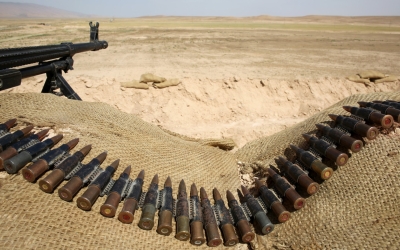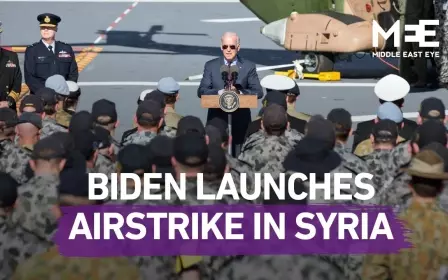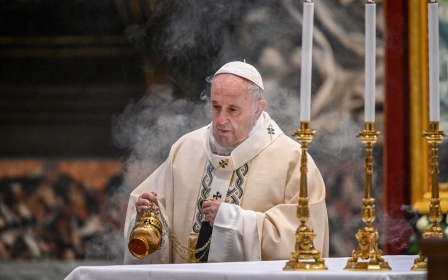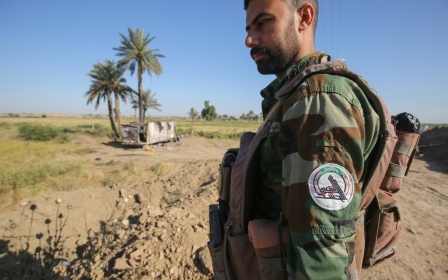Iran-backed Iraqi factions seeking de-escalation after US attack
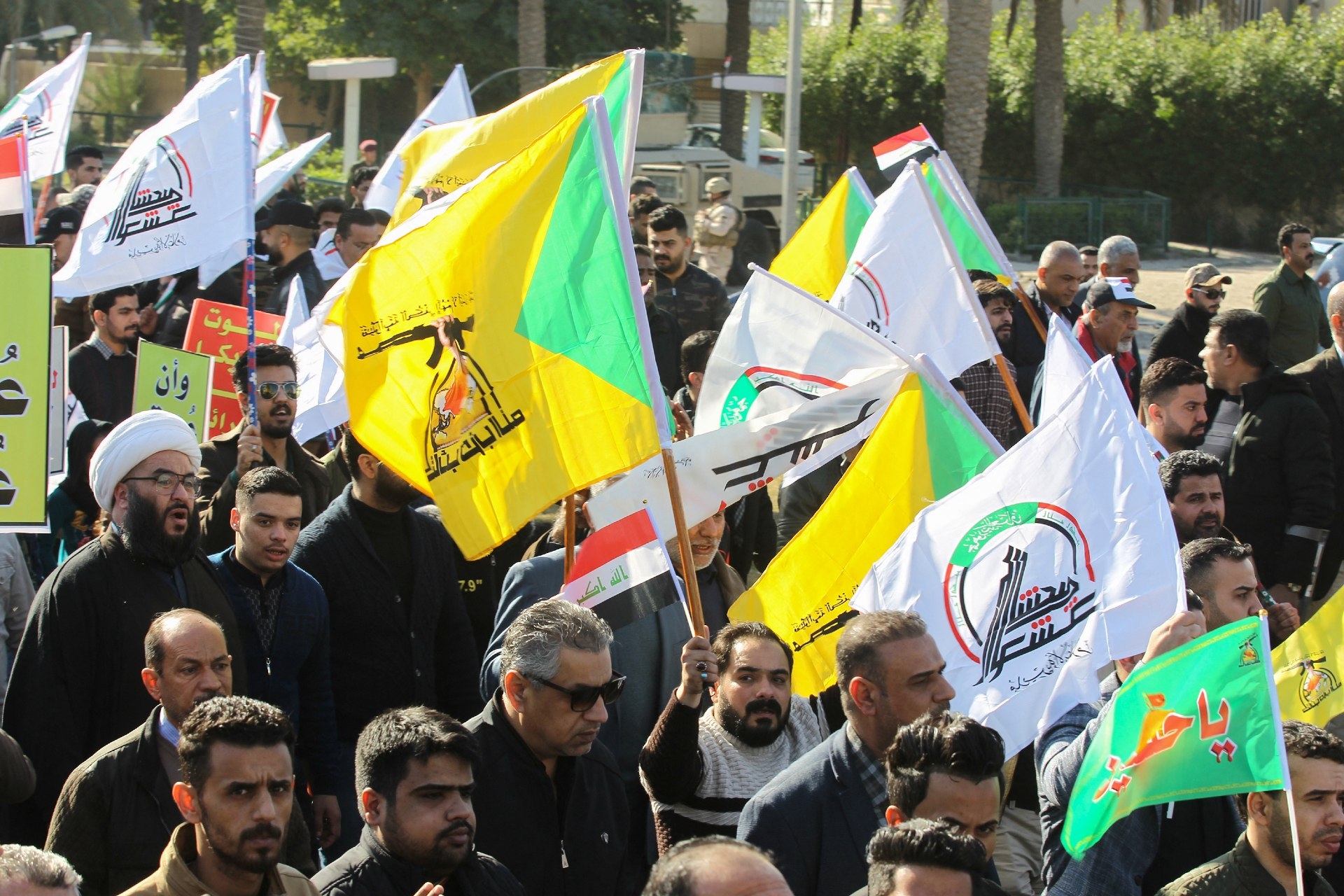
Most Iran-backed Iraqi armed factions are washing their hands of Thursday's US strike on a Kataeb Hezbollah position in Syria, and it is unlikely the raid will lead to any large escalation, commanders and Iraqi officials told Middle East Eye.
At least one fighter was killed and three others wounded in the 25 February US air strike on an informal border crossing where Kataeb Hezbollah and several other Shia armed factions' forces are stationed. Other reports have put the death toll at 22.
The US Defence Department said that the site targeted was a group of facilities used by Kataeb Hezbollah and Kataeb Sayyid al-Shuhada, and the strike was "in response" to the 15 February missile attack that targeted al-Harir air base, which hosts US forces in Erbil, northern Iraq.
Although the Iran-backed Shia armed factions said they were not involved in the Erbil attack, the US and Kurdish authorities in the autonomous Kurdistan Region insisted that one of them, Kataeb Sayyid al-Shuhada, was the prime suspect, officials told MEE.
'It is clear that the Americans avoided targeting Kataeb Hezbollah in Iraq for fear of sparking any diplomatic, political or security crisis'
- Senior commander of Iran-backed faction
However, it is unlikely that the Iranian-backed armed factions will respond to this latest attack inside Iraq, commanders told MEE. The factions are ostensibly supposed to be observing an unofficial truce with US forces, which was ordered by Iran.
New MEE newsletter: Jerusalem Dispatch
Sign up to get the latest insights and analysis on Israel-Palestine, alongside Turkey Unpacked and other MEE newsletters
"It is clear that the Americans avoided targeting Kataeb Hezbollah in Iraq for fear of sparking any diplomatic, political or security crisis, and they also made sure that the raid was of limited damage. The Iranians fully understand and appreciate this," a senior Iranian-backed Shia faction's commander told MEE.
"There are indirect negotiations that have actually started between the two parties [the US and Iran] through mediators, and neither of them will risk obstructing it now, especially the Iranians, who feel that they have gone a long way in reaching what they want and believe that they are in a better position now, so they prefer to continue the calm at this stage," he said.
"At least, we have not heard anything to the contrary, and we do not expect the orders to be changed in the near future."
Official silence
The body of Rahi al-Sharifi, a fighter who was killed during the raid, was taken on the afternoon of 26 February to Babylon governorate, where his family lives.
His funeral took place in a rally led exclusively by leaders of Kataeb Hezbollah and fighters who were keen to raise the faction"s yellow and green flags.
The flags of Iraq and the Hashd al-Shaabi paramilitary umbrella group that Kataeb Hezbollah operates under were noticeably absent.
Although Sharifi is officially registered as a Hashd al-Shaabi fighter, the paramilitary group, which is an official arm of the Iraqi state, has not issued a statement or position on the US raid. MEE has asked the Iraqi prime minister's office and the foreign minister for comment on the attack.
"The raid took place outside Iraq's borders, and we have nothing to do with it," a senior Hashd al-Shaabi official told MEE, speaking on condition of anonymity.
"Officially, we do not have forces operating outside the borders, and the targeted faction is not affiliated with the leadership of the Hashd al-Shaabi and does not obey its orders.
"So, officially, we have nothing to say."
Telegram channels and other social media linked to Kataeb Hezbollah have shown clear anger and dissatisfaction with the subsequent silence from the Iraqi government, the Hashd al-Shaabi authorities and the rest of the Iran-backed factions.
Kataeb Hezbollah has accused Iraqi intelligence services of cooperating with the US forces by "exploring" the site before the attack "by sending a number of shepherds who were walking around the place during the past few days". The Iraqi defence ministry has denied any cooperation.
"They [Kataeb Hezbollah] requested a media campaign be launched against the government and the Americans in response to the raid against their fighters, but everyone met their request with silence," the Hashd al-Shaabi official said.
'The problem is Kataeb'
Meanwhile, Iran is seeking to contain any possible repercussions.
Commanders of armed groups and senior Shia politicians told MEE that Iran has called all the leaders of factions associated with it to an urgent meeting in Tehran on Sunday, which one source said was "to discuss the latest developments on the Iraqi arena as part of its efforts to control the factions' reaction".
One of the obstacles that may face the Iranians in the next stage is "Kataeb Hezbollah's lack of discipline," after Tehran "reset the reaction" of the recently rebellious Asaib Ahl al-Haq faction and "returned it to the Iranian house of obedience," a commander of an Iranian-backed group told MEE.
"The Iranians are afraid of an unpredictable reaction. They do not want another escalation in Iraq now or a weakness that may be used against them, and the battalions may be the weak point at this stage," the commander said.
The commander noted that Asaib, which in recent months has targeted US assets against Tehran's wishes, is now more disciplined than Kataeb after an understanding was made with its leader, Qais al-Khazali.
'The Iranians are afraid of an unpredictable reaction. They do not want another escalation in Iraq now or a weakness that may be used against them'
- Iran-backed faction commander
"The problem now is Kataeb," he said.
"They were not involved in the attack on the Americans [in Erbil], but the Iranians understand that the new American administration needs to save face. Therefore, a calculated strike here or there with very limited losses will not cause harm compared to the greater interest achieved."
Sunday's meeting in Tehran could be pivotal in the course of Iran-US negotiations as the rivals seek a return to the 2015 nuclear agreement.
Similarly, it is likely to have an impact on the stability of Iraq and the Baghdad government's preparations for Pope Francis's visit on 5 March.
Iraqi Foreign Minister Fuad Hussein will pay a quick visit to Tehran on Saturday, which his ministry said was to discuss the latest developments and avoid "tension and escalation".
Middle East Eye delivers independent and unrivalled coverage and analysis of the Middle East, North Africa and beyond. To learn more about republishing this content and the associated fees, please fill out this form. More about MEE can be found here.


